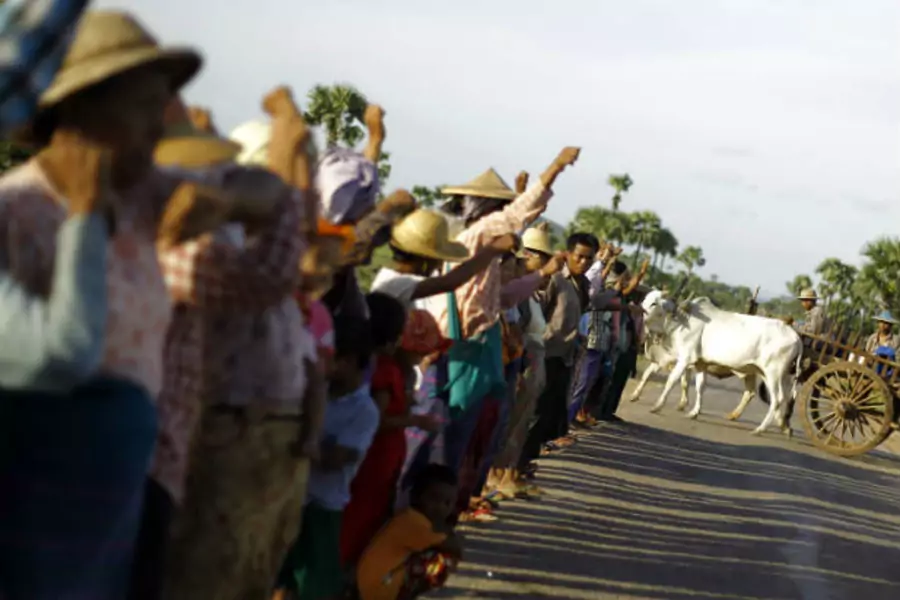The Paradox of Property Rights and Economic Development

More on:
Recent weeks have seen simmering property rights conflicts around the world: Burmese citizens marching in protest against the government’s seizure of their lands for a hotel zone; Vietnamese villagers contesting the confiscation of their land for an EcoPark satellite city project; and violent clashes breaking out in Panama City over a controversial law allowing the sale of state-owned land in the port city of Colón—Latin America’s largest duty-free zone.
Worldwide, marginalized groups (women, ethnic minorities, and the poor) often face high property insecurity, even when the property rights of foreign investors and domestic elites are secure. This is a pressing development challenge today on almost every continent. Just this year, property rights conflicts from Liberia to Indonesia to Myanmar to Ethiopia have revealed the potentially negative impact on vulnerable groups of growth-enhancing land acquisitions and foreign investment, which can exacerbate disparities between the rich and the poor and intensify food insecurity and resource scarcity—even while bringing macroeconomic growth.
These facts present a puzzling paradox. Since Adam Smith penned The Wealth of Nations over two centuries ago, it has been the conventional wisdom that strong property rights are a prerequisite for growth and economic development. Yet throughout history, land expropriation and property insecurity for marginalized groups has actually led to growth—although at the cost of these vulnerable groups. The enclosure of the commons in seventeenth century Britain, broadly acknowledged to have reduced overgrazing and increased agricultural investments on newly enclosed land, improved the property rights security of landed elites but eroded the property rights of small and medium cottagers who previously had rights to the newly enclosed commons. Increasing the security of private property rights for the gentry required expropriating the property of smallholder farmers and pastoralists.
In a forthcoming article in the Brooklyn Journal of International Law, I find that, statistically across countries, members of marginalized groups often face significantly higher property insecurity than foreign investors and domestic elites. Although secure property rights for the majority, elites, and foreign investors are positively related to long-run development, property rights for marginalized groups are not. Macroeconomic growth can occur in the presence of significant property insecurity for marginalized minorities. These research findings are based on a new bottom-up measure of property insecurity, which exposes inequalities in the property rights of different groups.
Eighteenth century philosopher Jean-Jacques Rousseau argued that the enshrinement of property rights in any social contract was, in essence, “a grand theft perpetrated by the rich, clever, and strong on the less well-off.” Law is not impartial, but instead reflects distributions of power.
In resource-rich Myanmar, the national economy relies heavily on the extraction of natural resources such as copper, timber, and hydroelectricity. But despite its resource wealth, Myanmar is Southeast Asia’s poorest country, with nearly one-third of the country’s 60 million people living below the poverty line. These rural poor face high levels of property insecurity. Plans to expand a large copper mine near Monywa in northwestern Myanmar have sparked widespread community demonstrations—some with over a thousand participants—against the mine’s expansion. Operated by the Chinese-owned Wanbao Mining (a subsidiary of a Chinese arms manufacturer) and Myanmar’s military, expanding the mine would require the purchase of huge tracts of land and the forcible relocation of dozens of villages. Destruction of the villagers’ agricultural livelihoods will almost certainly spur Myanmar’s macroeconomic growth through the development of the extractive industries sector, but will also severely threaten the incomes and food security of thousands of Myanmar’s poorest citizens.
These cases present difficult challenges for policymakers. If aggregate macroeconomic growth is the goal, then policymakers may wish to ignore (or encourage) the expropriation of land and resources from marginalized groups in order to reallocate these resources into the hands of more productive investors. But if the objective is broad and inclusive economic development that prioritizes poverty reduction, then policymakers may need to better protect the property rights of all social groups.
These trade-offs are made even more complicated by conflicts that can arise from property insecurity—the challenge I explore in my next post.
More on:
 Online Store
Online Store
